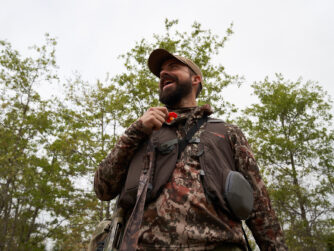Turkey hunting is more than just a pastime; it’s a way of life for those who immerse themselves in its challenges and traditions. It’s a pursuit that demands patience, skill, and an understanding of nature’s most elusive and instinctive bird. As seasoned hunters know, every turkey hunt is a test of wits between man and bird, and often, the turkey wins. But the thrill is in the game, the strategy, and the stories that come from time spent in the woods. Will Primos is a legend who knows this all-too well.
This is a companion post to S1 E2
The Moment of Truth: When the Turkey Has You
Will Primos says that one of the most profound moments in turkey hunting is when the bird gets the upper hand. You’ve been calling, waiting, and strategizing, and then, suddenly, he’s there. He’s already seen you before you even realized he was close. That single, piercing eye locks onto you, and in that moment, you know—you’ve been had.
This is a lesson learned through experience. Turkeys are masters of survival, their senses finely tuned to detect the slightest movement, the subtlest change in their environment. The best hunters respect this and approach each hunt with reverence for the bird’s intelligence and instincts.
Understanding Their Instincts
A turkey’s primary job is to stay alive, says Primos. He doesn’t worry about bills, work, or daily errands—his entire existence revolves around avoiding predators and ensuring survival. His instincts dictate his movements, and for a hunter to be successful, he must tap into those instincts.
One of the biggest mistakes many hunters make is setting up below a roosted turkey. A gobbler prefers to come to a call on level ground or uphill—not downhill. His legs are his first mode of escape, like a jet launching from an aircraft carrier, needing a strong push-off to gain the necessary speed for flight. If you set up below him, you’re fighting his instincts, and he’s not going to come down to you. Instead, position yourself at his level or slightly above to increase your chances of success.
Calling and the Dance of Strategy
The art of calling is one of the most debated and refined skills within Primos’s crew. When do you call? How often? How aggressively? The answer depends on the bird’s temperament, what hunters refer to as “taking his temperature.”
If you call and he gobbles back but doesn’t move, he’s waiting for you to come to him. If you call, go silent for a while, and he gobbles on his own, he’s looking for you. That’s when you’ve got him hooked, and it’s time to play the game carefully. Too much calling can make a bird wary, while just enough can pull him in. A good hunter knows when to shut up and let the bird’s curiosity do the work.
The Brotherhood of Turkey Hunters
Turkey hunters often describe themselves as part of a fraternity, a unique community bound by their passion for the sport. Unlike other types of hunting, turkey hunting has an obsessive quality—something that pulls at hunters’ souls. It’s why some marriages struggle during turkey season, as hunters can’t resist the call of the woods.
The Legacy and the Memories
For legendary hunters like Will Primos, turkey hunting isn’t just about the birds—it’s about the stories, the memories, and the legacy left behind. The beards and spurs collected over decades serve as reminders of hunts past, of moments frozen in time where hunter and turkey were locked in a battle of instinct and patience.
As hunters grow older, they look back on their hunts with a sense of nostalgia. What would you say to your last turkey, if you knew it was the last one? For many, the answer is simple: I wish you weren’t the last one.






